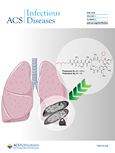Posted on March 08, 2017
Source: ACS Infectious Diseases

In Vivo-Selected Pyrazinoic Acid-Resistant Mycobacterium tuberculosis Strains Harbor Missense Mutations in the Aspartate Decarboxylase PanD and the Unfoldase ClpC1
Gopal P, Tasneen R, Yee M, Lanoix JP, Sarathy J, Rasic G, Li L, Dartois V, Nuermberger E, Dick T
Through mutant selection on agar containing pyrazinoic acid (POA), the bioactive form of the prodrug pyrazinamide (PZA), we recently showed that missense mutations in the aspartate decarboxylase PanD and the unfoldase ClpC1, and loss-of-function mutation of polyketide synthases Mas and PpsA-E involved in phthiocerol dimycocerosate synthesis, cause resistance to POA and PZA in Mycobacterium tuberculosis. Here we first asked whether these in vitro-selected POA/PZA-resistant mutants are attenuated in vivo, to potentially explain the lack of evidence of these mutations among PZA-resistant clinical isolates. Infection of mice with panD, clpC1, and mas/ppsA-E mutants showed that whereas growth of clpC1 and mas/ppsA-E mutants was attenuated, the panD mutant grew as well as the wild-type. To determine whether these resistance mechanisms can emerge within the host, mice infected with wild-type M. tuberculosis were treated with POA, and POA-resistant colonies were confirmed for PZA and POA resistance. Genome sequencing revealed that 82 and 18% of the strains contained missense mutations in panD and clpC1, respectively. Consistent with their lower fitness and POA resistance level, independent mas/ppsA-E mutants were not found. In conclusion, we show that the POA/PZA resistance mechanisms due to panD and clpC1 missense mutations are recapitulated in vivo. Whereas the representative clpC1 mutant was attenuated for growth in the mouse infection model, providing a possible explanation for their absence among clinical isolates, the growth kinetics of the representative panD mutant was unaffected. Why POA/PZA resistance-conferring panD mutations are observed in POA-treated mice but not yet among clinical strains isolated from PZA-treated patients remains to be determined.